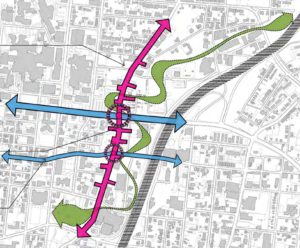Global Design Expert Reveals Key Innovation Corridor Elements
Beth Robinson
Uptown Consortium, Inc.
 The Uptown Consortium enlisted Sasaki, a global planning and design firm, to complete the master plan for the Uptown Innovation Corridor in Cincinnati. Bringing a broad, comprehensive vision to the table, the firm is working to articulate a thoughtful implementation framework that balances land use, urban design, placemaking and real estate strategies. The result is an execution roadmap to create a world-class urban district.
The Uptown Consortium enlisted Sasaki, a global planning and design firm, to complete the master plan for the Uptown Innovation Corridor in Cincinnati. Bringing a broad, comprehensive vision to the table, the firm is working to articulate a thoughtful implementation framework that balances land use, urban design, placemaking and real estate strategies. The result is an execution roadmap to create a world-class urban district.
Recently, I joined Sasaki’s Fred Merrill to present our refined vision for the Corridor for Cincinnati City Council’s Education, Innovation & Growth Committee. We discussed three development principles critical to realizing Uptown’s vision: great streets, great spaces and great places.
- Great streets help define great places by establishing an image and sense of identity. Streets that serve as major connections to and through the Uptown Innovation Corridor provide an opportunity to “set the tone” for the district’s appearance. Streetscape elements and materials, when thoughtfully designed and installed, can be used to create a visual signature that represents a place. The use of consistent and coordinated palettes of materials, colors, textures and patterns will create a cohesive visual identity for the Corridor.
- Great spaces are conducive to supporting the emerging innovation community. Collaboration will be promoted by establishing gathering spaces and close-knit ecosystems that foster creative growth. The Corridor will welcome community members by offering pedestrian visibility and access to green space amenities. Parking in the public realm will be minimized by using below grade parking when possible. All surface lots will be programmable, usable spaces that can be converted for community use (when not required for parking).
- Great places evolve through a combination of public and private actions that shape the physical environment. Businesses and residents will change over time, and with them, building facades, signs and outdoor spaces like patios and front yards. These changes add character that help create a sense of place. The design of public streets should incorporate consistent and coordinated elements, while private developments provide visual variety along the street.
These principles will be implemented to ensure the district is planned, designed and developed in a consistent and high quality urbanistic manner. Doing so will create more connections and collaboration, build a sense of community, and design an urban district that attracts and retains talent.
Beth Robinson is the President and CEO of the Uptown Consortium, a nonprofit community development corporation dedicated to the economic development of Uptown Cincinnati. To view a draft of the Uptown Innovation Corridor master plan, including development principles, visit the Uptown Innovation Corridor website.
OEDA Quarterly Report – Q3 2025
July 1 – September 30, 2025 From Expansion to Execution: OEDA’s Q3 2025 in Review In Q3 2025 (July–September), OEDA expanded high-value education and engagement while preparing for record fall events. We ran Site Selection & Development (43 registrants), two...
Dayton selected as host city for the 2026 OEDA Annual Summit
Dayton selected as host city for the 2026 OEDA Annual Summit Ohio’s premier state-level economic development conference will showcase the Dayton region in 2026 Akron, Ohio – Thursday, October 16, 2025 – The Ohio Economic Development Association (OEDA) announced...
OEDA Closes Summit with Inaugural Hall of Honor
OEDA Closes Summit with Inaugural Hall of Honor Dennis Mingyar and Kenny McDonald inducted; members approve 2026 board slate. Akron, Ohio – Friday, October 17, 2025 – The Ohio Economic Development Association (OEDA) concluded the 2025 OEDA Summit today with its...